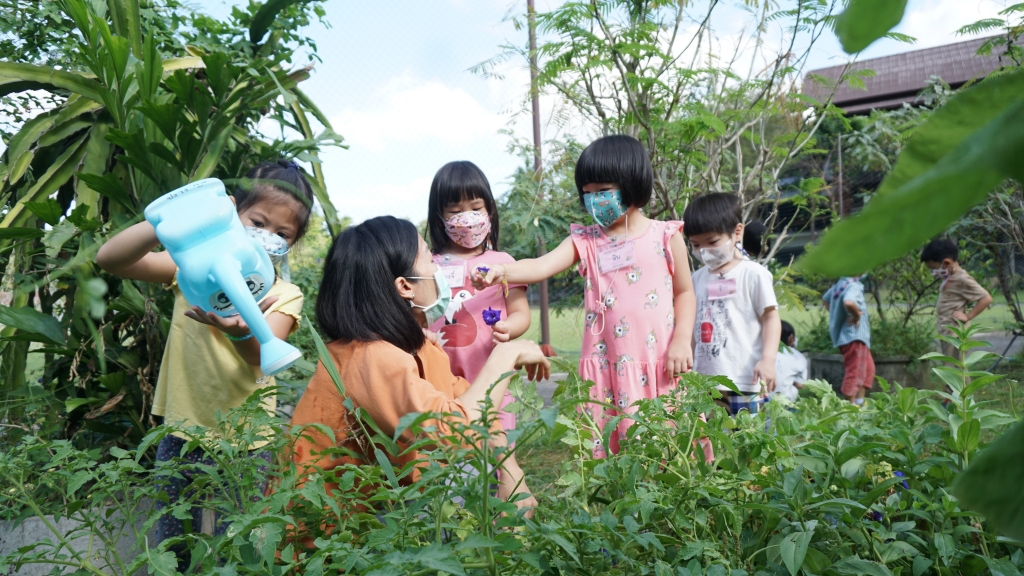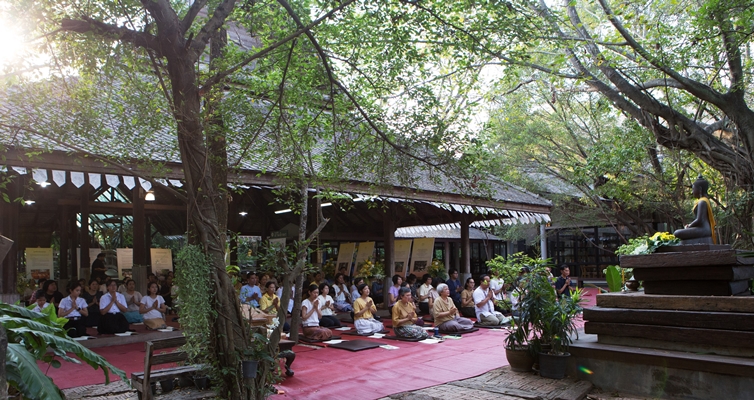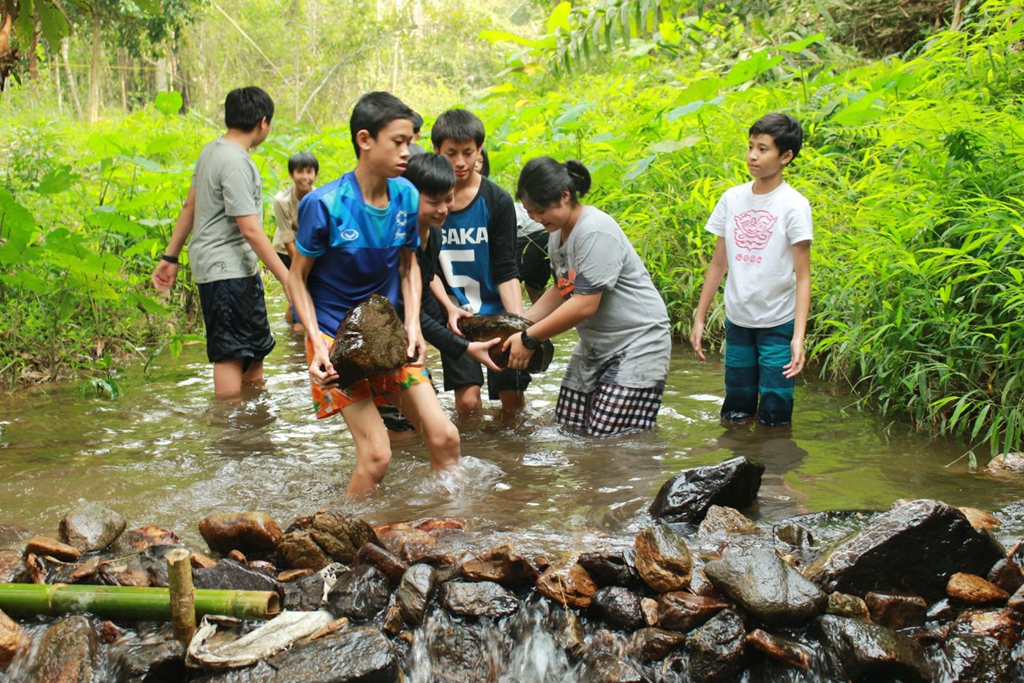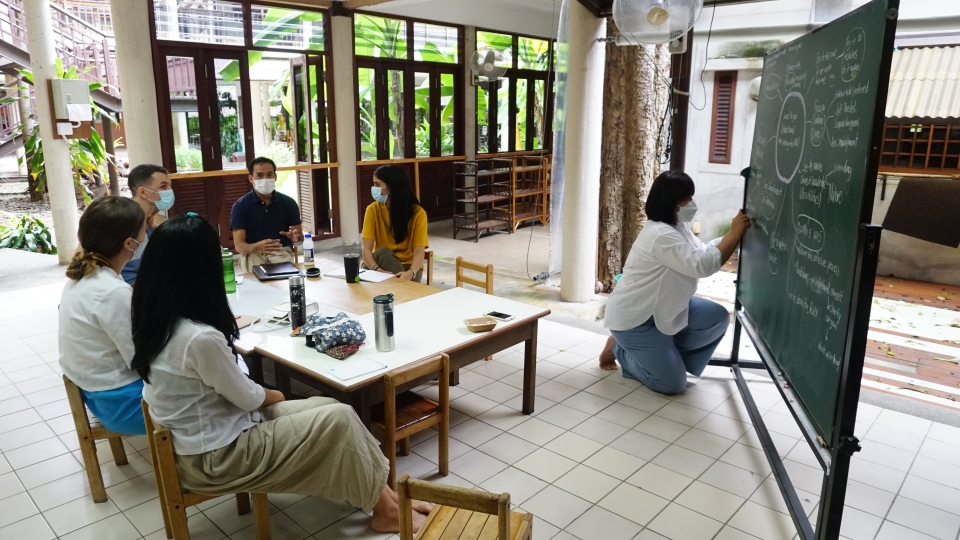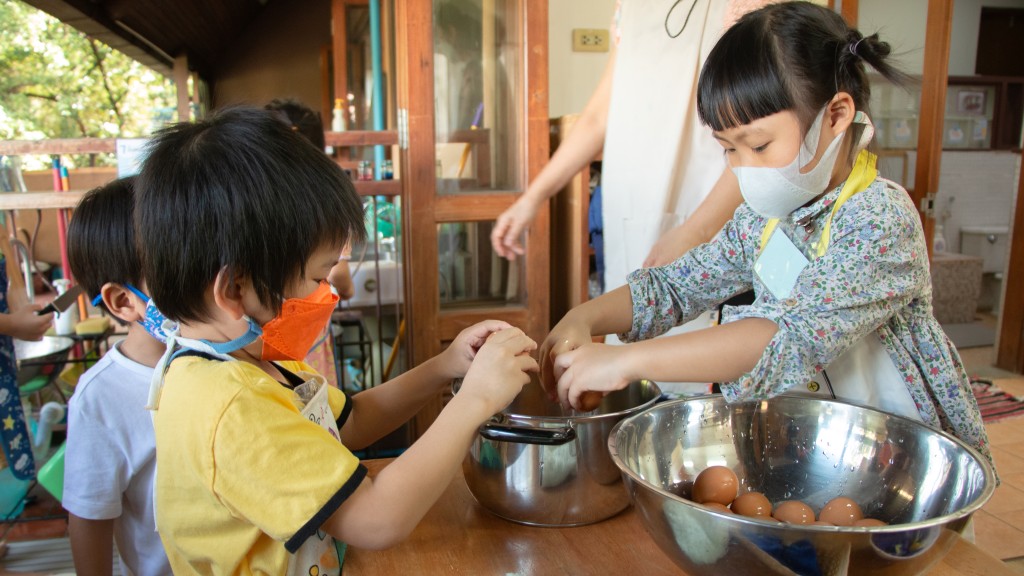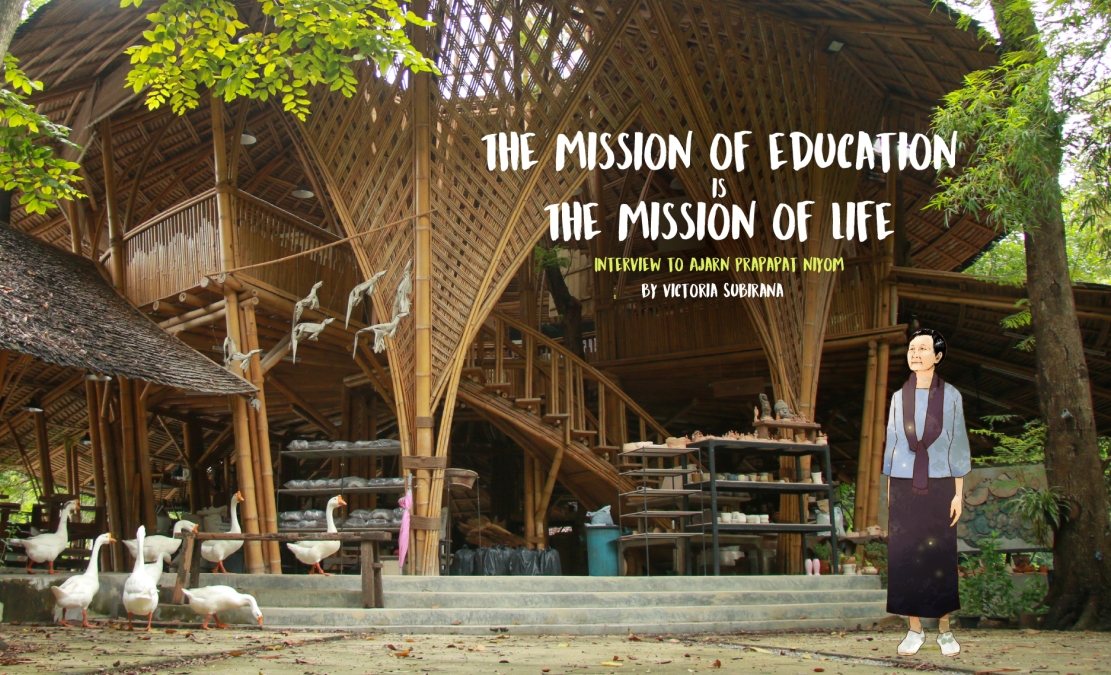
Interview to Ajarn Prapapat by Victoria Subirana: The mission of education is the mission of life.
| “This section is a survey to the founder of Roong Aroon School about different academic matters, teaching and learning methodologies and education perspectives.” – Victoria Subirana |
Victoria: If you could briefly define your life mission in relation to education, how would you feel?
Prapapat: In relation to education, it’s the same story, the same thing, the same topic about the mission in my life. So the mission of education would be about my life, our lives. We have to live our lives with the most achievements. I aimed to be free from greed, from hate, everything; to be free from suffering from all kinds of things. So, this kind of goal for my life has been rooted from the day I started this education here in Roong Aroon School.
Victoria: How many years ago?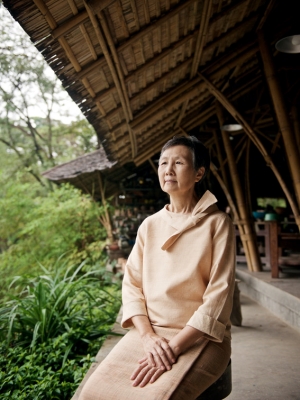 Prapapat: Twenty-Four years ago… maybe more than that. Few years of preparation. So, I learned a lot. I built up on how to get to know human beings, and how they can develop themselves from state to state, not only to learn the subjects, but the contents outside. You don’t learn only to be tested on what you know, but to learn what is worth your life, and how you live your life beneficial to all. So, this kind of meaning is greater than school context. Anyway, we can also widen the school context into the concept of this kind of living your life very wisely… wisely living. So, then I understand more and more how one could learn by themselves and reflect his or her process of thinking, and get into more conceptual understanding of all things, not only understanding in a cognitive way, but deeper than that into the metacognition. So, this is more important than teaching or learning subjects.
Prapapat: Twenty-Four years ago… maybe more than that. Few years of preparation. So, I learned a lot. I built up on how to get to know human beings, and how they can develop themselves from state to state, not only to learn the subjects, but the contents outside. You don’t learn only to be tested on what you know, but to learn what is worth your life, and how you live your life beneficial to all. So, this kind of meaning is greater than school context. Anyway, we can also widen the school context into the concept of this kind of living your life very wisely… wisely living. So, then I understand more and more how one could learn by themselves and reflect his or her process of thinking, and get into more conceptual understanding of all things, not only understanding in a cognitive way, but deeper than that into the metacognition. So, this is more important than teaching or learning subjects.
Victoria: So, you are talking now about the Pedagogical practices, right. So, which Pedagogical practices would you recommend for the teachers who are in Roong Aroon, who are at a very practical level? How would you synthesize this in a classroom?
Prapapat: It is too fast to talk about Pedagogy. We better talk about what we target from education. All of us, or each of us can share this kind of vision, first before we come together and make education in a pattern of a school, in a platform of a school. We have to share first what the visions are for these.
Victoria: Exactly, could you please start talking about that?
Prapapat: So, I have to share to every staff of the first year/the beginning year also. We tried to share together, every year; Maybe sometimes/a few times in a year, or more than that. We’d just come back and start talking about what we are doing, why we have to do this, and what we are going to do, and our target is. We are describing that we have students in a class, and we are doing everything- namely activities, and that is our satisfaction; how our lives can also teach us better than before. If they are not teachers, they won’t be happier than before, like or not, I don’t know.
They should be happier, because this kind of job, we cannot call it a job. This is not based on office hours, we should be teachers, we should be directors. We should be teachers at every moment in our lives. So, this is not just an occupation. This is a way of life in which you can bring good things to children. You can develop the new generations to be better than before, you have to recognize or realize that in your two hands, your small hands, you can do a lot of things. You can change the world.
Victoria: What is the profile of a Roong Aroon teacher?
Prapapat: Every teacher who come to Roong Aroon, they didn’t know before that they have to asked kind of question to themselves. But, bit by bit before they came here we had a dialogue together. We shared our visions together. They’ve come to understand bit by bit. We didn’t have it already made for teachers like that. They had to improve their skills or listening. They had to improve their skills of thinking in a deeper way. That’s very important. They had to improve their behavior, even their personal behavior. They had to change something and transform their mindset into voluntary visions. They have to contribute to their job and make it have more meaning than before. So, just like continuing the process. You cannot stop it. You cannot finish it at once, even during graduation. You just keep on this kind of process. We have to believe in every human being’s development day to day.
I think before they came, they finished their graduation from university, so they have some kind of experiences, and they had some kind of confidence that their prior achievements are alright. But after they worked for a while, we came together and shared our targets for understanding a more in-depth, conceptual dimension for everything. This was recognized as something they could learn. First of all, after certain achievements, they have been doing better working here.
So, this is not a school for students, this is a school for teachers also.
Victoria: And for the community, right?
Prapapat: For the community. Because, sometimes, we just ignore the relationship behind us. Actually, we have a very close relationship together, here. Especially teachers and students. And there’s teachers and teachers, and teachers with supervisors. This close relationship is very important, and it could make everything give a different way of thinking. So, this kind of impact from communal relationships is very powerful. You use the word “embrace”. Everyone should come together and care for each other and learn to communicate among each other in a positive way, and try to make things like when you are among a number of people, you can have a better solution than when you are alone. We believe that, and all of us have proven that this is very important. Sometimes, someone may try to have a commanding role, but it’s not working. Because being in a commanding role just leads to no friendship, no empathy, no caring for each other, no waiting for others to understand nor asking them to understand us. That role never works. But sometimes, it happens. Finally, they realize they have to change.
Victoria: Which kind of human beings do you foster behind the competencies behind academic learning? For you, what is more important? How do you relate that academic competency to human beings? Which profile of human beings would you like to see during, and after the process in Roong Aroon?
Prapapat: I say these two parts depend on which angle you are new to. For example, when a teacher designs a lesson plan, they think about Knowledge, Skills and Objective, as attitude and value. They have to understand exactly that if you teach these topics, the students should be better, not only knowing more, they should be better. I would always ask a question ‘what is the difference between you not teaching this topic and you teaching’. There would be differences between these situations. So, you can imagine how teachers would think about this. They are to make the knowledge understandable to them as well as having the learners understand why they have to learn this, and this kind of topic for learning can be worth it for their lives.
It is like illusions that make us understand that these are two different things, but no, they are the same. If you can’t understand it yourself, then why are you learning this? You cannot understand the knowledge well. Right? You cannot use it. You cannot benefit from it, so it is worthless to only know the subjects and remembering, and then having good scores in tests. Then after that, you are still the same. You don’t change. Education should not be that kind of thing. Education should make people, or students/learners better day by day from each subject. Every subject can build up a person to a good life. You need a good life.
Victoria: Which kind of citizens are we creating in this kind of education?
Prapapat: Which kind of citizens? If you’d like to have a word, I can repeatedly say “Wise Citizens”
Victoria: They have to participate in the mainstream of society being democrats, which kind of citizens will lead or be in the most democratic country that would hold this value. How can they foster these values into their professions, into their fellowship positions, into their families? Even if they become presidents?
Prapapat: Even if they have a foundation, it is a strong foundation of ethics, because it is a relation between the conceptual understanding to yourself, and also the ethics when one understanding themselves to be loving and they can integrate everything… we can call it in a very prosperous way. They can brace for every kind of situation, even if it is difficult, very complicated. They are still strong. They can be calm and handle these kinds of situations by themselves.
Of course, they use some kind of knowledge, but they have to use very firm kinds of consideration with that kind of situation, in different kinds of situations. And that means they have very strong foundations and ethics.
So, this kind of citizen is what every country wants to have. So we create citizens for the world. It’s not only for the school, not only for Thailand.
Victoria: So, do you think that if many schools in the world embraces these teachings and these concepts, humanity will evolve and will lead us to humanity going in a new direction?
Prapapat: Yes, of course. I believe that. I feel it’s very easy for human beings to be developed like that because we also, because everyone has this kind of seed in their hearts. They just need a chance to nurture this seed to grow.
Victoria: So now we are heading to the practical level. Do you think that a Roong Aroon teacher has to observe the kid and bring about this seed from the inside to prepare the lesson? What would you tell that new teacher, who is confused as there are no books to prepare lesson plan, to observe the kid and how to pull that knowledge to build up their lesson plan. Could you please talk about this?
Prapapat: We work together with the teachers, and the supervisors also. We work together with the teachers on their jobs, and we have a chance to look into the details in what they are planning for their children, and what is most beneficial to the children in each lesson plan. So, this is one to guarantee that teachers have been crossing the important point which may happen to the students from starting to see the objective, and how the children understand or come to conceptual understanding to that, and what is the learning process, which kind of activities, which place, which media, which textbook, which everything. How can students engage into these learning activities and become older from these activities of learning? And finally, how they can produce or achieve all kinds of outputs of learning.
So, we share together in this kind of process of planning. It’s really good that we can share our personal attitude among ourselves, so we can prepare for what goes on in class. So, teachers can understand better, and follow this kind of preparation, so they can have time to… Firstly to be frightened. “Oh they have to look like this. They have to look into the details like this. They have to go through this decision making together like this.” This is really frightening today. This is a hardship. “This is hard work! It’s not possible to do this every time!” But finally, it’s possible to do this.
Victoria: Now, a very personal question. For those parents or even teachers, or some students who come from a Thai system of evaluation setting that they are graded from zero to ten. They think that in Roong Aroon, the children are being assessed or being evaluated. They don’t know what is the kind of assessment to verify that the teachers reached their goals, and they don’t know how to move from the lack of confidence of that child from number in a list. And if you are not number 10, you’d feel very hurt.
Prapapat: I just had a Facebook Live with the parents with a question like from the parents just this morning. And I answered them that we don’t have a basic measurement, but we have a wise way to evaluate your children. You make sure that the children engage in learning. They are committed to that learning. They work and they never stop and they try and try, and do not care about the time. That commitment is what you have to evaluate for them to reach success; one stage of success.
They are involved. They have intentions. That’s another stage of success. And then they’re committed. And then they come to another stage; Trial and Error, and then change their way of learning by themselves. That’s another stage of success. And finally, they feel they are teachers. That is the greatest success. So, it’s not just the measurement from outside.
You have to understand you cannot have the basic kind of measurement. Some children can understand very quickly at this very moment. But some children understand later on. So, don’t judge… Don’t judge. It’s dangerous to judge the students. Only understand that they come to the stages of success by themselves.
Victoria: How is Roong Aroon suitable for students with learning disabilities or different learning abilities? Why does the setting embrace everyone and give opportunities to everyone?
Prapapat: Because of this kind of strong belief, we can wait and see. We can wait and give them more opportunities one by one and wait and see and let them grow at their own pace; not to assimilate their achievements at the same pace with the others.
Victoria: Like in traditional schools? It’s not possible like what you made different here?
Prapapat: Because of the teachers. Because of the… An understanding.
Victoria: Teachers that were trained to understand the individuality of each students?
Prapapat: They have to understand the individuality of each student. And the teachers will have to adjust their lessons and their exercises.
—
LEADERSHIP AT ROONG–AROON (Pedagogical Management Team) (PMT)
One of the functions of the Pedagogical Management Team should be giving support to the teachers in different areas. The idea of collective management is amazingly effective because each member of the team brings about solutions from a variety of backgrounds and a diversity of expertise.
I believe that teachers should come to school in a relaxed, calm and serene attitude. Thinking that, they are observed, monitored, guided, assessed, rewarded, and appreciated for their performance.
In a Holistic School, the relationship of teacher-director cannot be based upon a hierarchic supervision where the director is always right, and their mission is to control the teachers work from a perspective of superiority.
I observed how in many schools’ directors are more like a police officer. With an attitude of distrust, instead of being the person who is always ready to assist the teacher, should it be something he or she cannot solve.
For the new profile of (PMT) paradigm should be that professional who can provide direct assistance both; from the experience gained after many years of practice as school teacher, school director or any other position, and from the acquisition of knowledge through research, investigation, and academic achievement.
Thereafter, I would like to describe what should be the objective of the (PMT) and explore how each member of the group can contribute and fit into the following categories:
- Aiding and guidelines in academic matters: enhancing teaching techniques, improving lesson plans, assessment methods, field trips etc.
- Classroom organization: settlements in the classroom, classroom distribution, logistical matters.
- Resources and materials: supplements, supplies, Learning Centers, equipment, etc.
- Discipline or behavioral issues: with students, with teachers-non teaching staff.
- Legal aspects: policies, contracts, sickness, leaves, etc.
- Personal distress: preoccupations, emotional instability, family or personal issues that affect teacher’s response towards work.
Finally, the GOAL of (PMT) this year should be cohesion amongst the members of the team and appreciation of each other’s qualities, virtues, and strengths. Manifesting our feelings not only at individual level but also showing collective appreciation. Not only verbally, but by written and using other forms of nonverbal communication.
|
Victoria Subirana Victoria Subirana is a teacher. She was born in a small town in Spain. After completing a Masters in Curriculum and Teaching from Michigan State University, She moved to Nepal and established her first school in Kathmandu in 1991. Almost 30 years, Victoria dedicated her whole life to underprivileged children. She has successfully developed and implemented her own methodology of teaching called ‘Pedagogy for Transformation and Evolution’. The methods elevate Mental Maturity which is based on Tibetan Buddhist teachings. |
